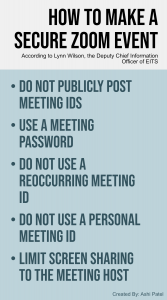Multiple organizations at the University of Georgia have been targeted by Zoombombers using hateful language against minorities, leaving leaders of these organizations responsible for damage control.
Zoombombing is when uninvited participants intentionally join a Zoom or virtual meeting with the goal of disruption. These acts typically are prejudiced and are targeted toward specific minority groups.
The Hispanic Student Association, Next Act musical theatre group and, according to an email through the Archnews Listserv, a UGA staff council meeting have been the most recent to experience Zoombombings. Leaders within these organizations have had to address the situation with their members and communities, as well as internally process the Zoombombing itself.
HSA executive member Amy Guzman-Reyes recounted the conversations between her and other board members. She explained that while trying to process the emotions of the Zoombombing, her organization experienced at the UGA Involvement Fair on Sept. 3, 2020, they had to prioritize reaching out to members and making a public statement.
The Zoombombing consisted of an anonymous group of several white men yelling offensive words and mocking the Spanish language.
“There was a lot of us talking and being very openly vulnerable with each other, and our political action chair was trying to make that into a politically savvy statement,” Guzman-Reyes said about the first executive board meeting after the event. “We want to make sure the messages and statements we release as an organization are concise and respectful… We wanted to send out a message that other orgs, other Latinx students and the administration would be able to process.”
Ciara Pysczynski, the artistic director of Next Act, had a similar experience after Next Act’s Cabaret show on Sept. 25, 2020 was also subject to a targeted Zoombombing.
The group experienced yelling from multiple anonymous accounts using racist, homophobic and transphobic language.
Pyscynski explained the Next Act executive board was on their Slack channel asking questions such as: “oh my goodness, what just happened?” “how can we handle this?” and “who do we need to contact?”
We were just in panic mode: crisis and communication,” Pysczynski said. “My managing director and I were just so stressed and so upset, because that was a horrible thing to experience.”
The Next Act board struggled to get a statement out while trying to comfort each other over what happened. However, after getting their first message out, the group got together to talk about their feelings about the Zoombombings.
“Everyone was a little shaken,” Pysczynski said. “It was kind of not something you would ever expect to happen to a little musical theatre group…It was for the most part shock and horror. Bryson Parker, the associate artistic director, was very upset because he was targeted by some of the attacks they used.”
For HSA however, it was less surprising. Guzman-Reyes said it was something she would expect in a public place, and the event just made her feel “tired.”
“Oh of course, what else do we expect?…As a BIPOC student at a PWI [Predominantly White Institution] you kind of have to ignore a lot of the things that happen,” Guzman-Reyes said about her feelings almost a month after the incident. “If you spent all of your time being angry at everything that institutions that weren’t catered and weren’t designed for people of color to exist and to thrive in, you would be angry all the time.”

Zoombombings are not unique to UGA. The New York Times addressed Zoombombings in mid-March 2020 as the COVID-19 pandemic had most people turning to virtual settings for work, school and socializing. It was reported that multiple public Zoom events had to be shut down due to anonymous users broadcasting pornographic videos and photos.
In a follow-up story, The New York Times found some Zoombombings had turned to organized hate crimes: “While those incidents may have initially been regarded as pranks or trolling, they have since risen to the level of hate speech and harassment, and even commanded the attention of the F.B.I.”
According to an email sent by Timothy M. Chester, vice president for information technology, and Beth Bailey, interim director of equal opportunity office, to UGA faculty, staff and students, the most recent Zoombombing was a UGA Staff Council meeting on Oct. 7, 2020.
The email revealed that the staff council meeting was subject to, “anti-Semitic messaging.” No staff member was available to speak on the Zoombombing.
UGA Enterprise Information Technology Services (EITS) have since put out detailed guides on how to secure a Zoom session on the EITS Help Desk Knowledge base. However when asked, Lynn Wilson, the deputy chief information officer of EITS, said they have received very few phone calls with concerns from students, faculty, and staff about securing a Zoom session.
Both HSA and Next Act have felt lasting impressions on what happened during their events, and have now made it a requirement to register for their Zoom events instead of publicly posting the meeting ID. With a valid registration, the passcode for entry will then be emailed to participants. This is one of the guidelines UGA EITS has put out for securing a virtual event.
As of yet, no Zoombombers have been identified, according to the email sent by Chester.
Ashi Patel is a senior majoring in journalism at the Grady College of Journalism and Mass Communication at the University of Georgia.









Show Comments (1)